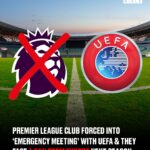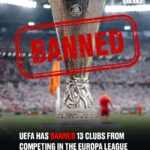UEFA rules confirm sixth Champions League place for Premier League as Newcastle United watch on

The battle for Champions League qualification enters a decisive phase tonight with four potential European contenders in action across two high-stakes fixtures. For the first time in the competition’s storied history, six Premier League clubs will participate in the same Champions League campaign next season—a development that has dramatically altered the landscape of European qualification in English football.
Aston Villa host Tottenham Hotspur at Villa Park (7:30pm kick-off) in a contest with significant implications for the European places. A Villa victory would catapult them temporarily into the Champions League positions with Manchester City otherwise engaged in FA Cup final preparations against Crystal Palace this weekend.
Meanwhile, fifth-placed Chelsea welcome Manchester United to Stamford Bridge (8:15pm kick-off) in another crucial encounter. Should Chelsea emerge victorious, they would leapfrog Manchester City into fourth place in the Premier League standings. More remarkably, a five-goal margin of victory would see the Blues surge ahead of Newcastle United into third position.
Newcastle United’s Champions League Aspirations
Newcastle United, currently occupying third place in the Premier League, face title challengers Arsenal at the Emirates Stadium on Sunday. The stakes could hardly be higher for Eddie Howe’s men, with a victory effectively securing their return to Europe’s premier club competition. Arsenal, meanwhile, require just one additional point from their final two fixtures to cement their own Champions League status.
Though Newcastle cannot be displaced from the Champions League places this weekend regardless of results elsewhere, they face an anxious wait as Villa, Chelsea, and Nottingham Forest all take to the field before the Magpies’ crucial encounter in North London.
The significance of Champions League qualification for Newcastle cannot be overstated. After narrowly missing European football by finishing seventh last season, the club has made remarkable progress under Howe’s stewardship. Champions League participation represents not just a sporting triumph but a financial windfall and powerful statement of intent from the ambitious Tyneside outfit.
The Revolutionary UEFA Coefficient Rule
This unprecedented scenario of six English clubs qualifying for the Champions League stems from two key factors: UEFA’s recently implemented European Performance Spots rule and the unusual circumstance of two traditionally strong Premier League sides—Tottenham and Manchester United—struggling domestically while excelling in European competition.
The European Performance Spots mechanism, introduced by UEFA last season, rewards the two nations whose clubs have demonstrated superior collective performance across all European competitions with an additional Champions League berth. Based on this season’s metrics, England and Spain have each secured a fifth Champions League position determined by league standing.
This development provides a significant advantage to clubs like Newcastle, Chelsea, Aston Villa, and Nottingham Forest, all of whom are embroiled in the race for Champions League qualification. Even Manchester City, whose domestic form has wavered below their customary standards this campaign, benefit from the safety net of potentially finishing fifth yet still securing Champions League football.
The Tottenham and Manchester United Anomaly
Perhaps the most remarkable aspect of this season’s European qualification picture is the position of Tottenham Hotspur and Manchester United. Despite languishing in 17th and 16th positions in the Premier League respectively—an astonishing 24 and 25 points outside the top five—both clubs stand on the precipice of Champions League qualification through an alternative route.
By reaching the UEFA Europa League final, scheduled for May 21st in Bilbao (8pm kick-off), either club can secure Champions League football for next season by lifting the trophy. This creates the extraordinary possibility that two of the Premier League’s worst-performing non-relegated sides could secure Champions League qualification ahead of clubs that have demonstrated substantially greater consistency throughout the domestic campaign.
Both clubs confirmed their Europa League final berths last Thursday. Tottenham overcame Norwegian side Bodø/Glimt with a comprehensive 5-1 aggregate victory in their semi-final tie, while Manchester United dispatched Athletic Bilbao, coincidentally the hosts of this year’s final, with an emphatic 7-1 aggregate scoreline.
Newcastle’s European Journey Already Secured
While Champions League qualification remains the primary objective for Newcastle United, the club has already guaranteed European football for next season by virtue of their Carabao Cup triumph in March—making them the first English club to secure European qualification this season.
This achievement ensures that, at minimum, Newcastle will participate in the Europa League in the 2025-26 campaign. However, the club’s hierarchy has made no secret of their loftier ambitions, with Champions League qualification representing the next significant milestone in their accelerated development under their current ownership structure.
Newcastle’s current league position puts them in pole position to realize these ambitions. Sitting third in the table with just two games remaining, a solitary point against Arsenal would guarantee a top-six finish and, at worst, Europa League football. More importantly, victory at the Emirates would confirm top-five status and the associated Champions League qualification that now accompanies it.
The Ripple Effect on European Places
Newcastle’s success in the Carabao Cup has created a cascade effect on European qualification throughout the Premier League. Their Conference League position earned through that triumph will be redistributed down the Premier League table. As it stands, this place will be awarded to the team finishing seventh in the final standings, though this could potentially drop to eighth position should Manchester City triumph in the FA Cup final.
The permutations become even more complex when considering Chelsea’s involvement in the Conference League. Should Chelsea win that competition and finish seventh in the Premier League, while Manchester City also lift the FA Cup, the European Performance Spot would bypass Chelsea. In this scenario, an additional Europa League place would be allocated to the team finishing eighth, with the Conference League position being withdrawn entirely.
The Transformed European Landscape
The 2025-26 season will mark a watershed moment for English football’s participation in European competition, with a record six clubs competing in the Champions League simultaneously. This unprecedented representation underscores the Premier League’s continued dominance as Europe’s most successful and financially powerful domestic league.
For clubs like Newcastle United, who have invested heavily in infrastructure and playing talent with the explicit aim of establishing themselves among Europe’s elite, this expanded opportunity comes at an ideal moment. The financial rewards associated with Champions League participation—estimated at a minimum of £40 million in prize money alone, with potential earnings exceeding £100 million when broadcasting and commercial revenues are considered—would significantly bolster Newcastle’s ability to compete with the established elite both domestically and in Europe.
Eddie Howe’s Transformative Impact
Central to Newcastle’s resurgence has been manager Eddie Howe, whose tactical acumen and leadership have transformed a club that was battling relegation just two seasons ago into genuine Champions League contenders. Howe’s systematic approach to squad building and player development has yielded remarkable results, with the team demonstrating a cohesion and tactical sophistication that belies the relatively brief period of his tenure.
The recognition of Howe’s achievements was recently acknowledged in the Premier League’s monthly awards, where he received plaudits alongside talismanic striker Alexander Isak. The Swedish international has been instrumental in Newcastle’s push for Champions League football, with his clinical finishing and intelligent movement providing the cutting edge to complement the team’s solid defensive foundation.
Bruno Guimaraes: The Heartbeat of Newcastle’s Renaissance
Captain Bruno Guimaraes has emerged as the heartbeat of this evolving Newcastle side. The Brazilian international, whose technical proficiency and leadership qualities have drawn admiration from across Europe, recently reaffirmed his commitment to the club’s project despite persistent interest from continental giants.
In a revealing interview, Guimaraes disclosed conversations with Manchester City manager Pep Guardiola but emphasized his dedication to Newcastle’s trajectory. “We’re building something special here,” Guimaraes stated. “I believe in what we’re creating at Newcastle, and Champions League qualification would be another significant step in our journey together.”
This commitment from key players represents a significant shift in Newcastle’s standing within the football hierarchy. Where once the club might have been viewed as a stepping stone to more established European powers, they are increasingly positioned as a destination club capable of retaining elite talent and competing at the highest level.
The Summer Transfer Window: A Critical Juncture
Qualification for the Champions League would substantially influence Newcastle’s approach to the upcoming transfer window. With the Premier League confirming a revised deadline for this summer’s transactions, sporting director Paul Mitchell faces a critical period in consolidating and enhancing the squad’s capabilities to compete across multiple fronts.
Several players are anticipated to depart St. James’ Park when the window opens, with reports suggesting that five first-team squad members have been identified for transfer. A £20 million deal for one unnamed player is reportedly already agreed in principle, indicating the club’s proactive stance in reshaping their playing staff.
Conversely, Newcastle continue to be linked with high-profile acquisitions. Lille striker Jonathan David, whose contractual situation has attracted interest from numerous elite European clubs, is reportedly among Newcastle’s priority targets. The Canadian international has publicly ruled out 17 potential destinations, though Newcastle are believed to remain among the clubs under consideration for his signature.
Challenges and Competition
While Newcastle’s trajectory under their current ownership has been impressive, the intensified competition for Champions League places underscores the challenges that lie ahead. Traditional powerhouses like Manchester United, Chelsea, and Tottenham Hotspur—despite their inconsistent domestic form this season—possess the financial resources and historical prestige to mount serious challenges for European positions in subsequent campaigns.
Similarly, the emergence of Aston Villa and Nottingham Forest as credible European contenders illustrates the Premier League’s evolving competitive landscape. Villa, in particular, have developed impressively under Unai Emery’s guidance, with the Spanish coach implementing a tactical framework that has consistently troubled the league’s established powers.
Moreover, the expanded Champions League format set to be introduced next season presents its own unique challenges. The increased fixture load will test the depth and resilience of Newcastle’s squad, particularly given their relative inexperience in managing the demands of elite European competition alongside domestic responsibilities.
The Next Fortnight: Defining Newcastle’s Season
As the Premier League season approaches its denouement, the next fortnight promises to define Newcastle United’s campaign. Sunday’s clash with Arsenal represents not just an opportunity to secure Champions League qualification but a chance to make a statement against one of English football’s established powers.
Beyond the immediate objective of Champions League qualification, Newcastle’s performance in these final fixtures will set the tone for their summer preparations and broader strategic planning. A strong finish would enhance their attractiveness to potential recruits and strengthen their negotiating position in the transfer market.
For supporters who have endured periods of stagnation and frustration under previous ownership regimes, the prospect of Champions League nights returning to St. James’ Park evokes memories of the club’s previous European adventures under Sir Bobby Robson. Those campaigns, particularly the memorable 2002-03 season when Newcastle competed in the second group stage of the Champions League, represent a standard to which the current iteration of the club now aspires.
Conclusion: A New Chapter in Newcastle’s European Odyssey
As Newcastle United stand on the threshold of returning to Europe’s premier club competition, the significance extends beyond mere sporting achievement. Champions League qualification would represent tangible evidence of the club’s accelerated development and vindicate the strategic vision implemented since the change of ownership.
For a club with Newcastle’s passionate support base and rich historical traditions, participation in the Champions League aligns with their perception of their rightful place in the football hierarchy. The next fortnight will determine whether this vision becomes reality, but regardless of the outcome, the foundations have been established for a sustained period of competitiveness at the elite level.
In a season where an unprecedented six English clubs will feature in the Champions League, Newcastle United’s potential inclusion would mark one of the most compelling narratives in European football’s recent history—a storied club reclaiming its place among the continent’s elite through strategic investment, astute management, and unwavering ambition.
For the Toon Army, the dreams of European nights under the floodlights at St. James’ Park may soon be realized once more. For English football more broadly, Newcastle’s resurgence contributes to a landscape of intensified competition that can only enhance the Premier League’s reputation as the world’s most compelling domestic competition.















